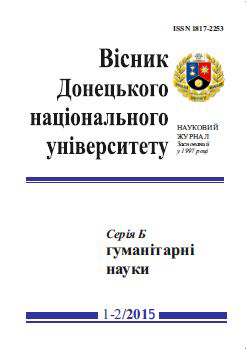The discourse of secularization as a reflection and design of process of secularization.
Keywords:
discourse, secularization, modern, post-secularAbstract
There is analyzed in article a history of European discourse about secularization as the thinking of the intellectuals of Modern about the history of their own civilization. On the other hand, the first modern philosophical theories were implicit rather build a new reality, and only in the middle of the XIX century there was an explicit discourse about secularism, and then on and return to it processes. The article begins with an analysis of the process of constructing the secular paradigm of the selfreflection of European civilization in the rationalist and empirical philosophy of Modern. After that the author explores the secularization trends in German transcendental idealism, which marked a complete break with the transcendental and became the forerunner of the atheistic concepts of the nineteenth century. Since Kant, European thought has given up attempts to research the transcendental intellectual means, transferring all thoughts on religious subjects within the “only reason”. In Hegel's philosophy the secularization trend connected with evolutionism, creating specific understanding of history, which asserts the superiority of the secular over the religious, plans a way to further increase the part of secular in the common history, and in the individual consciousness. In this respect Hegel's philosophy stands as the quintessence of the Modern worldview, and further systems only develop it, make it more explicit (the philosophy of Marx is the clearest example, although it is possible to remember and the system of Feuerbach, Nietzsche, Freud). At the same time the new science – sociology, which accompanied and legitimized the process of secularization in the past century becomes a spokesman of the secular worldview of Modernity. In the mid-twentieth century evolutionary theory of secularization as the dominant paradigm of sociological vision of history was in crisis, due to the process of religious revival that began after world wars. Trying to overcome the current crisis, sociology and social philosophy of the XX – beginning of XXI centuries have built a new discourse, which has been associated with the concepts of postsecular, contrsecularization, desecularization. Reflecting in their theories the General course of Western history, the thinkers of this period also contributed to the dissemination of the relevant view. The best example is Jürgen Habermas, who passed from the proclamation the victory of the left liberal values in the late XXI century to witnessing the coming of a post-secular era in the beginning of the XXI century. Postsecular era in the perspective proposed by Habermas, brought a decisive challenge to the European liberalism because of its values protect the position of people, who live in the West, but do not want to follow the same liberal values.References
Бофре Ж. Диалог с Хайдеггером. Приближение к Хайдеггеру. Книга 3 / Ж. Бофре. – СПб.: Издательство «Владимир Даль», 2009. – 358 с.
Декарт Р. Избранные произведения / Р. Декарт. – М.: Изд-во полит. лит., 1950. – 712 с.
Жижек С. Ирак: история про чайник. – М.: Праксис, 2004. – 244с.
Кант И. Религия в пределах только разума // Трактаты и письма. Т. 3 / Иммануил Кант. – М.: Наука, 1980. – С. 78-279.
Кант И. Что значит ориентироваться в мышлении? // Сочинения на немецком и русском языках. Т. I. / И. Кант. – М.: ИФ АО «КАМИ», 1993. – С. 193-237.
Хабермас Ю. Против «воинствующего атеизма». «Постсекулярное» общество – что это такое? [Электронный ресурс] – режим доступа: http://www.russ.ru/pole/Protivvoinstvuyuschego-ateizma.

